 MyDogBreeds
MyDogBreeds Jack Russell Terrier is originated from United Kingdom but Australian Shepherd is originated from United States. Jack Russell Terrier may grow 20 cm / 7 inches shorter than Australian Shepherd. Jack Russell Terrier may weigh 24 kg / 52 pounds lesser than Australian Shepherd. Both Jack Russell Terrier and Australian Shepherd has almost same life span. Both Jack Russell Terrier and Australian Shepherd has almost same litter size. Jack Russell Terrier requires Low maintenance. But Australian Shepherd requires Moderate maintenance
Jack Russell Terrier is originated from United Kingdom but Australian Shepherd is originated from United States. Jack Russell Terrier may grow 20 cm / 7 inches shorter than Australian Shepherd. Jack Russell Terrier may weigh 24 kg / 52 pounds lesser than Australian Shepherd. Both Jack Russell Terrier and Australian Shepherd has almost same life span. Both Jack Russell Terrier and Australian Shepherd has almost same litter size. Jack Russell Terrier requires Low maintenance. But Australian Shepherd requires Moderate maintenance
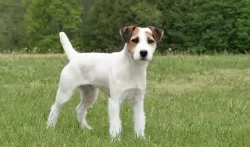 The popular Jack Russell Terrier was developed in Devonshire in the south of England in the late 1800's so as to hunt foxes.
The popular Jack Russell Terrier was developed in Devonshire in the south of England in the late 1800's so as to hunt foxes.
Often believed to be the Parson Russell Terrier, the Jack Russell Terrier was developed by Parson John Russell. This is where the dog gets his breed name from. Some people get the Jack Russell Terrier a little bit mixed up with the Parson Russell terrier, when it fact its actually a different breed, but sharing a common ancestry.
The Jack Russell Terrier is smaller than the Parson and bigger than the Russell Terrier. The breed became known in the U.S. by the 1930s and the Jack Russell Terrier Association of America wanted recognition by the American Kennel Club, which was granted in 2000.
 The Australian Shepherd, known fondly as ‘Aussies’, is actually an American breed, with the first official registry being in the 1950s. Basque Shepherds from Spain settled in Australia at the end of the 19th century, later moving to the United Stated with their dogs in tow. It is from these dogs that the breed originated. In the UK too, this breed of dog has many enthusiastic followers.
The Australian Shepherd, known fondly as ‘Aussies’, is actually an American breed, with the first official registry being in the 1950s. Basque Shepherds from Spain settled in Australia at the end of the 19th century, later moving to the United Stated with their dogs in tow. It is from these dogs that the breed originated. In the UK too, this breed of dog has many enthusiastic followers.
For many years, the Australian Shepherd has been recognized for their wonderful abilities as stock- or herding dogs, and today in Australia they continue to work as stock dogs and often take part in herding trials.
More recently, this working dog breed has been selectively bred to develop both Toy- and Miniature Aussies, and the American Stock Dog Registry actually recognizes 3 sizes today.The Australian Shepherd Club of America was also founded in 1957 to promote the breed.
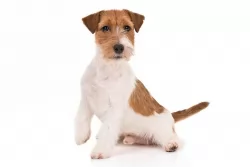 The Jack Russell Terrier is a small dog that weighs between 6 and 8kg and stands at between 25 – 38cm. The body length of the dog should be in proportion to the height.
The Jack Russell Terrier is a small dog that weighs between 6 and 8kg and stands at between 25 – 38cm. The body length of the dog should be in proportion to the height.
He is essentially a white dog with orange or fawn colored patches. The coat is mostly smooth and short, but the coat can also be longer and rough or it can be broken which is a combination of rough and smooth. Regardless of coat type, they are dense, double coats which will require brushing at least twice a week to remove loose hairs. He may also be tri-colored such as being white with black and tan patches.
He has alert, bright dark brown eyes and ears which are somewhat erect and which flop over at the tips. The tail has always been traditionally docked, giving him an attractive, compact look about him but unfortunately the tail is often left long on the dog these days.
Your Jack Russell Terrier is a lively, tenacious, bold, fearless, feisty, cheeky, confident, independent, intelligent and full of life dog. He is super energetic and exuberant, spirited and full of personality.
There are some dog owners who are exhausted by him and would prefer a more quieter dog breed as their companion. Nonetheless he has some excellent characteristics such as being a totally devoted and loving dog.
It is why it is a good idea to have him trained and socialized as it calms him down and makes him more obedient. He is very intelligent and training him will be easy.
 Similar in appearance to the Border Collie, the Australian Shepherd is a medium sized dog and has a medium length coat which is straight to wavy with a weather resistant undercoat. The range of coat colours is amazing, and you’ll find blue, blue merle, black and red merle and all of these are with or without tan points. The Australian Shepherd is a drop-eared breed where prick ears are sometimes seen. Some Aussies are born with naturally bobbed tails while most have full, long tails.
Similar in appearance to the Border Collie, the Australian Shepherd is a medium sized dog and has a medium length coat which is straight to wavy with a weather resistant undercoat. The range of coat colours is amazing, and you’ll find blue, blue merle, black and red merle and all of these are with or without tan points. The Australian Shepherd is a drop-eared breed where prick ears are sometimes seen. Some Aussies are born with naturally bobbed tails while most have full, long tails.
There is variety in the eye colour too, and they are often heterochromatic, which means that they can have two different coloured eyes or the one eye can even be bi-coloured. Most times the eyes are brown, but they can be blue too.
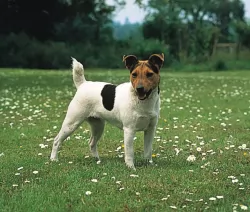 With loads of vibrant personality, the energetic Jack Russell Terrier has got so many wonderful characteristics to his name – devotion, intelligence, charming, lively, playful and he is an entertainer – you’ll always be laughing a him.
With loads of vibrant personality, the energetic Jack Russell Terrier has got so many wonderful characteristics to his name – devotion, intelligence, charming, lively, playful and he is an entertainer – you’ll always be laughing a him.
You do need to pay him attention – you can’t just plonk him in your backyard and forget about him. He wants your love and attention and ignoring him can lead to problem behavior such as obsessive barking.
Give your Jack Russell Terrier all the love and care he needs, and you’ll have an exceptional pet and friend.
 The Australian Shepherd is an intelligent dog, learning quickly. As a herding dog, he also has strong guarding instincts and will make a good watch dog. The dog has a balanced, even disposition, and even though he may show some reserve, he is certainly not a shy dog and isn’t aggressive.
The Australian Shepherd is an intelligent dog, learning quickly. As a herding dog, he also has strong guarding instincts and will make a good watch dog. The dog has a balanced, even disposition, and even though he may show some reserve, he is certainly not a shy dog and isn’t aggressive.
Your Aussie is a kind, loving, and devoted pet. He loves his human family and wants to spend lots of time with them. Don’t leave him without human companionship as he craves it and forms strong bonds with his family. Provide him with good care and with lots of fun and games and you’ve got an exceptional friend for life.
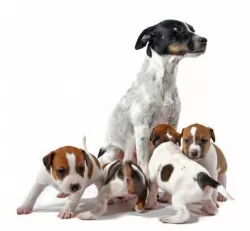 This particular dog breed has a reputation for being healthy and living to a good age such as 16 or 17 years of age. Of course he needs to be given proper care to reach such a good age.
This particular dog breed has a reputation for being healthy and living to a good age such as 16 or 17 years of age. Of course he needs to be given proper care to reach such a good age.
Some common dog disorders you might want to be aware of are -
Lens luxation is actually a common hereditary disorder in these dogs, but even so, with good care, your dog isn’t likely to battle with it. What happens is that the lens in the eye becomes displaced. There are two types, with Posterior luxation being the lesser severe one.Treatment is available.
Patellar luxation is an hereditary disorder affecting the knees of the dog. The kneecap slips off the groove where it sits and you may notice your dog running while holding his hind leg in the air. It can sometimes slip back in place and then you see your dog running in his usual way. It becomes more serious when it affects both legs.
 Aussies are a healthy breed and won’t cost you a fortune at the vet. However, like every other breed, they are also prone to certain health conditions such as cancer. When choosing a puppy, always look for a good, reputable breeder who can show you health clearances.
Aussies are a healthy breed and won’t cost you a fortune at the vet. However, like every other breed, they are also prone to certain health conditions such as cancer. When choosing a puppy, always look for a good, reputable breeder who can show you health clearances.
This is a dog ailment that can be inherited. It is where the femur doesn't fit properly into the pelvic socket of the hip joint. Also, as the dog ages, arthritis can develop.
Epilepsy an hereditary disorder where the seizures your dog gets can be treated and controlled.
Osteochondrosis Dissecans, commonly known as OCD is an orthopedic condition which comes about because of improper growth of cartilage in the joints. It can cause painful stiffening of the elbow joint for instance.
Progressive Retinal Atrophy or PRA is a degenerative eye disorder that can finally lead to blindness. Reputable Aussie dog breeders have their dogs' eyes certified regularly by a veterinary ophthalmologist.
Your newborn Australian Shepherd may well be strong and healthy, but he isn’t immune from life-threatening illnesses. Vaccinations are imperative for your Aussie puppy, with vets usually recommending that puppies be vaccinated for the first time from 6 to 8 weeks of age.
These vaccinations will include the 5-in-one and includes Parvovirus, Distemper, Hepatitis and Parainfluenza. Later on the puppy will get his first rabies shot and he will also require booster vaccinations.
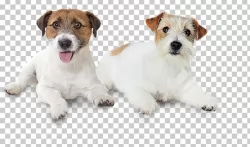 The Jack Russell Terrier isn’t just a small dog that can be left to his own devices. He will need proper training and socialization early in life to make him obedient and better to get on with.
The Jack Russell Terrier isn’t just a small dog that can be left to his own devices. He will need proper training and socialization early in life to make him obedient and better to get on with.
He may be a small dog, but he certainly won’t do in the city where he is cooped up in a place with a handkerchief of a garden. He needs lots of space to run and play. He wants his human family to join in with walks, hikes, ball games and swimming.
You can buy excellent commercially manufactured dog food which caters for energetic small dog breeds like the Jack Russell Terrier.
Once you have selected the best one for your pet, with dry kibble being better in terms of dental health - you can also add in some brown rice, vegetables and cooked chicken. This is highly beneficial to all dog breeds. A little bit of raw meat can sometimes be added in too.
The bottom line is to to prevent your pet from eating foods high in preservatives, additives and fillers. Never leave your pet without a constant supply of fresh, cool water.
 With his medium length coat, the Australian Shepherd sheds. In fact this particular breed sheds his hair the entire year round, but you’ll notice that with the arrival of Spring, he sheds more as this is when he is losing his Winter coat. You will most certainly need to brush his coat at least 2x a week to get rid of all those tufts of hair and to also prevent matting.
With his medium length coat, the Australian Shepherd sheds. In fact this particular breed sheds his hair the entire year round, but you’ll notice that with the arrival of Spring, he sheds more as this is when he is losing his Winter coat. You will most certainly need to brush his coat at least 2x a week to get rid of all those tufts of hair and to also prevent matting.
A puppy will need 4 bowls of vet-recommended food a day. How much your adult Australian Shepherd gets will depend on his age, size and activity levels.The quality of food you buy will make a difference as it will keep your Aussie in good shape. Remember to include raw or cooked meat into his diet once a week or so. For more on feeding your Aussie, speak to your vet. Always ensure a constant source of fresh, cool water.
The Australian Shepherd is a strong willed dog, used to playing the dominant role with the herding of livestock. He’ll need firm training and socialization if you want to make him an amicable family pet.
Like many herding dogs, Australian Shepherds are loyal to their family and don’t easily take to strangers. Aussies make awesome companions for families with kids who have been taught how to treat dogs and other pets with kindness and gentleness. Just like a dog needs socialization, a child needs to respect a sleeping, feeding dog and to leave him in peace.